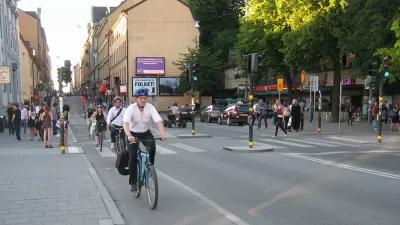Once upon a time there was a transportation planner driving thru the sunbelt. He pulled into a truck stop and while fueling his vehicle he noticed a couple of workers working on the shoulder down the road. One man appeared to be digging holes about three feet across and three feet deep along the side of the road.
Once upon a time there was a transportation planner driving thru the sunbelt. He pulled into a truck stop and while fueling his vehicle he noticed a couple of workers working on the shoulder down the road. One man appeared to be digging holes about three feet across and three feet deep along the side of the road.
A few hundred yards down the road the other fellow appeared to be filling the holes back in. As visions of soil testing, cable installation and utility mapping danced through his head the planner became curious. He decided to have a burger and fries.
He sat by the window and watched as the work men continued down the road, one digging holes and the other filling them in about thirty minutes later.
His curiosity increased.
As he pulled away from the truck stop he couldn't help himself and decided to pull over to ask what the men were working on. As he approached, the first man politely greeting him, introducing himself as Joe. As the planner asked what he was doing, Joe proudly explained it was his job to dig holes every 50 feet to a specification of three feet in diameter and three feet deep.
The second man had now walked over and similarly introduced himself as Butch and boasted, "My job is to fill in the holes and make sure the soil is compacted."
The planner paused in puzzlement while Joe interjected, "Too bad you couldn't meet Chuck, its his job to put trees in the holes, but he's out sick today."
Transportation planning can be a lot like Joe and Butch working with Chuck out sick. If we just go through the motions and don't offer honest, objective and relevant substance for the decision makers there is no value in the planning. Sometimes Joe and Chuck show up and Butch doesn't and the plans die. Sometimes we just dig holes and neither Chuck nor Butch show up. Sometimes everything is done right and no one appreciates the trees.
Season's greetings and may all your 2011 holes have trees and backfill and be appreciated by the policy makers and public.

Planetizen Federal Action Tracker
A weekly monitor of how Trump’s orders and actions are impacting planners and planning in America.

Map: Where Senate Republicans Want to Sell Your Public Lands
For public land advocates, the Senate Republicans’ proposal to sell millions of acres of public land in the West is “the biggest fight of their careers.”

Restaurant Patios Were a Pandemic Win — Why Were They so Hard to Keep?
Social distancing requirements and changes in travel patterns prompted cities to pilot new uses for street and sidewalk space. Then it got complicated.

Platform Pilsner: Vancouver Transit Agency Releases... a Beer?
TransLink will receive a portion of every sale of the four-pack.

Toronto Weighs Cheaper Transit, Parking Hikes for Major Events
Special event rates would take effect during large festivals, sports games and concerts to ‘discourage driving, manage congestion and free up space for transit.”

Berlin to Consider Car-Free Zone Larger Than Manhattan
The area bound by the 22-mile Ringbahn would still allow 12 uses of a private automobile per year per person, and several other exemptions.
Urban Design for Planners 1: Software Tools
This six-course series explores essential urban design concepts using open source software and equips planners with the tools they need to participate fully in the urban design process.
Planning for Universal Design
Learn the tools for implementing Universal Design in planning regulations.
Heyer Gruel & Associates PA
JM Goldson LLC
Custer County Colorado
City of Camden Redevelopment Agency
City of Astoria
Transportation Research & Education Center (TREC) at Portland State University
Camden Redevelopment Agency
City of Claremont
Municipality of Princeton (NJ)






























